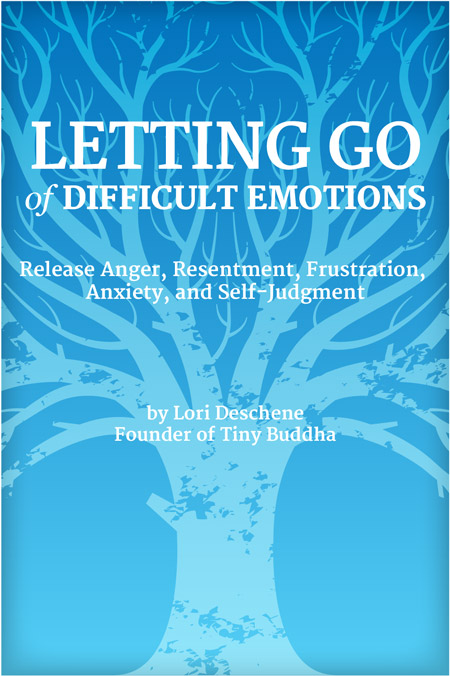
“If you let go a little, you will have a little peace. If you let go a lot, you will have a lot of peace.” ~Ajahn Chah
Growing up, I often felt emotionally overwhelmed, causing others to call me “too sensitive.”
It was very clear to me from a young age that emotion was a sign of weakness, but try as I may, I couldn’t escape mine.
I believed there was something wrong with me for feeling so deeply—that I was fundamentally bad because of it—then I felt bad about my inability to change.
As the years went on and life got harder and more complex, I struggled with severe anxiety and depression. I wasn’t equipped with the tools to manage the natural emotions I felt after others mistreated me, so instead, I learned to numb them.
I numbed them with food, alcohol, and men, to name a few crutches, but my efforts often backfired.
With so much pain repressed under layers of fear and shame, I often exploded in hysterics after one drink too many, unleashing on some defenseless friend or boyfriend a dramatic story of anguish and an eruption of despair.
Coupled with the aftermath of bullying, this tendency to lose control of my emotions led me to fear social situations.
Even if I didn’t drink—which I often did, to ease my anxiety—I couldn’t be certain something wouldn’t trigger painful feelings and I wouldn’t embarrass myself with my response.
What if I obsessed and looked neurotic? What if I attacked and looked combative? What if I cried and looked unstable?
Judgment seemed inevitable—from others and myself—but even worse I’d have to hear three seemingly patronizing words: let it go.
As if it were that easy. As if I could just roll all my feelings into a neat little snowball and toss it out into the distance.
I felt this was incredibly insensitive—that someone who clearly didn’t understand the depth of my pain would suggest that moving beyond it was as simple as “letting it go.”
As if “letting it go” was an easy, one-time decision, like pulling off a Band-Aid.
“Let it go” seemed like advice from the disinterested and lazy. At least, that’s what I thought back then.
After spending years of my life trapped in a maze of disempowering stories, I’ve realized dwelling, complaining, and analyzing my life does very little to help my emotional state.
I now know I don’t need to be a prisoner inside my own mind.
I can’t help that I’m emotionally sensitive—and having leveraged my sensitivity to create this site, I now know I wouldn’t want to change that—but I can choose not to keep myself miserable and stuck.
It turns out “let it go” is pretty helpful advice. But it’s such an abstract concept. What I wished someone told me back then was how.
How do you let go of anger when your first thought in the morning, the last one at night, and the majority of the ones in between revolve around how you were hurt?
How do you let go of resentment when it feels like you’ll never be able to change the things that you resent?
How do you let go of frustration when you feel stuck, stagnant, and completely powerless to change it?
How do you let go of worries when even the thought of letting them go fills you with worry?
And how do you let go of your disappointment with yourself when you try your best to “just let it go” and continually struggle to do it?
I’ve devoted much of the last decade to studying the art of letting go—a skill that’s helpful to all of us, not just those of us who are highly sensitive people.
In this time, I’ve learned a few things that help with all disempowering emotions and a few things to address some of the specific ones that are the most difficult to release.
In my new 54-page eBook, Letting Go of Difficult Emotions, I’ve tackled them one by one, addressing how to let go of:
- Anger
- Resentment
- Frustration
- Anxiety
- Self-Judgment
Each section offers a few simple things you can do to release the feelings, come back to the present moment, and find a sense of peace.
And best of all, I’ve decided to release this eBook with a “name your price” model. The suggested payment is $10; however, you can pay as little as $1 or give more than that, if you’ve gotten a lot from Tiny Buddha and would like to give more back.
"*" indicates required fields
I hope you find this eBook helpful, and I welcome any feedback at email(AT)tinybuddha.com.
About Lori Deschene
Lori Deschene is the founder of Tiny Buddha. She started the site after struggling with depression, bulimia, c-PTSD, and toxic shame so she could recycle her former pain into something useful and inspire others to do the same. You can find her books, including Tiny Buddha’s Gratitude Journal and Tiny Buddha’s Worry Journal, here and learn more about her eCourse, Recreate Your Life Story, if you’re ready to transform your life and become the person you want to be.
- Web |
- More Posts













 Though I run this site, it is not mine. It's ours. It's not about me. It's about us. Your stories and your wisdom are just as meaningful as mine.
Though I run this site, it is not mine. It's ours. It's not about me. It's about us. Your stories and your wisdom are just as meaningful as mine.